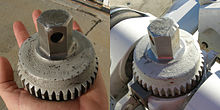Jesus nut
This article contains weasel words: vague phrasing that often accompanies biased or unverifiable information. (February 2012) |

Jesus nut or Jesus pin is the main rotor retaining nut [1] that holds the main rotor to the mast of some helicopters, such as the UH-1 Iroquois helicopter; or more generally is any component that represents a single point of failure with catastrophic consequences.
The term jesus nut may have been coined by American soldiers in Vietnam; the Vietnam War was the first war to feature large numbers of soldiers riding in helicopters.
If the Jesus pin were to fail in flight, the helicopter would detach from the rotors and the only thing left for the crew to do would be to "pray to Jesus." Real examples of the Jesus pin failing are few and far between. However the pin must be checked before the flight.[2] Some more recent helicopter systems do not have a Jesus nut.
More recently, in generic engineering the concept has widened to include any single component of a system whose failure would cause catastrophic failure of the whole system.
In literature the term "Jesus nut" was used in Chickenhawk by Robert Mason, a narrative about his experiences as a pilot in the Vietnam War.
Another use for the term is found in rock climbing, in which it refers to the first piece of protection placed on a pitch.[3] This piece must be placed to resist an outward pull as well as a downward pull in order to avoid the possibility of a "zipper", in which the outward pull on the rope from the belayer arresting a falling climber pulls protection pieces from the bottom up. In addition, the Jesus nut prevents the possibility of a factor two fall onto the belay anchor.[4]
See also
References
- ^ http://www.huey.co.uk/images/history/techsheet8.jpg
- ^ Aviation Safety Maintainer 1/2002: Fatigue and Complacency - A Potentially Sorrowful Mixture Transport Canada
- ^ Coley, David (2013). High - Advanced Multi Pitch Climbing. Akreative. pp. Section 408 of 5150.
- ^ Long, John and Gaines, Bob (2006). "Climbing Anchors, 2nd Edition". Falcon Press, London. ISBN 0-7627-2326-2.

